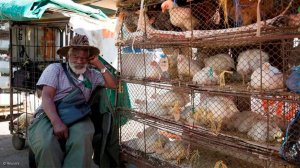/ MEDIA STATEMENT / The content on this page is not written by Polity.org.za, but is supplied by third parties. This content does not constitute news reporting by Polity.org.za.
The Department of Agriculture, Land Reform and Rural Development is calling on livestock farmers and livestock owners in all provinces to limit the movement of cloven-hoofed animals as far as possible. This amid an outbreak of Foot and Mouth Disease (FMD) on five farms in the Eastern Cape areas of Humansdorp and East London.
Cloven hoofed animals should not be moved unless it is absolutely necessary, considering among others that the East London farm sourced animals from multiple origins. This will allow for the department to find and quarantine further undetected, affected properties to prevent any further spread of the disease.
The significance of the incubation period for FMD cannot be over-emphasised. This is the period when animals appear to be healthy, in the early stages of infection (incubation period) where they are shedding virus without showing clinical signs of disease yet.
The investigation into the origin and extent of the Foot and Mouth Disease (FMD) outbreak in the Eastern Cape is ongoing. Clinical signs of FMD were observed on the first reported farm (index farm) and samples were collected immediately on 30 April 2024. Since then, clinical signs of FMD were found on four (4) more farms in the Humansdorp area, and one (1) in the East London area.
The laboratory at Onderstepoort Veterinary Research in Pretoria confirmed that the results from samples collected on these farms are positive for SAT3 on serology and PCR tests. Virus identifications by sequencing have identified the same SAT3 virus on these positive farms.
Various steps have been taken including the placement under quarantine of locations that were confirmed to be positive for FMD by the Eastern Cape Provincial Veterinary Services. A full epidemiological investigation is underway to identify the possible origin and any other properties that could be at risk.
Immediate neighbours and all linked locations have been placed under precautionary quarantine, pending clinical and serological investigation to determine their FMD status. Cattle and sheep on the affected farms were vaccinated against FMD to reduce the viral load on these farms.
Department of Agriculture, Land Reform and Rural Development l Departement van Landbou, Grondhervorming en Landelike Ontwikkeling l Muhasho wa zwa Vhulimi, Mbuedzedzo ya Mavu na Mveledziso ya Mahayani, l uMnyango Wezolimo, Izinguquko Kwezomhlaba Nokuthuthukiswa Kwezindawo Zasemakhaya l Ndzawulo ya Vurimi, Antswiso wa Misava na Nhluvukiso wa Matikoxikaya l Litiko Letekulima, Tingucuko Kutemhlaba Nekutfutfukiswa Kwetindzawo Tasemaphandleni l UmNyango wezokuLima, ukuBuyiselwa kweNarha nokuThuthukiswa kweeNdawo zemaKhaya l Kgoro ya Temo,Peakanyoleswa ya Naga le Tlhabollo ya Dinaga- magae l Lefapha la Temothuo, Kabobotjha ya Naha le Tlhabollo ya Dibaka tsa Mahae l Lefapha la Temothuo, Pusetsodinaga le Tlhabololo ya Metsemagae l ISebe lezoLimo, uBuyekezo lwemiHlaba noPhuhliso lamaPhandle
Farmers are further urged to observe biosecurity on their farms and to protect their own herds from becoming infected with disease. Section 11 of the Animal Diseases Act imposes a legal duty on any owner or manager of animals to take all reasonable steps to prevent their animals from becoming infected with any disease and to prevent the spread of any disease from their animals or land to other animals or other properties.
In line with this, a regulation was prescribed in October 2022 by the Minister of Agriculture, stipulating that cloven hoofed livestock may only be moved if accompanied by a health declaration from the owner of the animals, attesting to their health at the time of moving. In addition, all cattle, sheep, and goats newly brought onto a farm must be kept separated from the resident herds for at least 28 days.
FMD is a controlled animal disease in terms of the Animal Diseases Act, 1984 (Act No 35 of 1984) and the Act prescribes certain control measures, like isolation and movement control, that are being enforced by Veterinary Services. Should any suspicious clinical symptoms (salivation, blisters in the mouth, limping or hoof lesions) be seen, it should be reported to the local State Veterinarian immediately and such animals must not be moved under any circumstances.
Issued by Department of Agriculture, Land Reform and Rural Development
EMAIL THIS ARTICLE SAVE THIS ARTICLE ARTICLE ENQUIRY
To subscribe email subscriptions@creamermedia.co.za or click here
To advertise email advertising@creamermedia.co.za or click here











